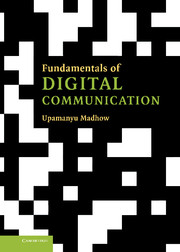Book contents
- Frontmatter
- Contents
- Preface
- Acknowledgements
- 1 Introduction
- 2 Modulation
- 3 Demodulation
- 4 Synchronization and noncoherent communication
- 5 Channel equalization
- 6 Information-theoretic limits and their computation
- 7 Channel coding
- 8 Wireless communication
- Appendix A Probability, random variables, and random processes
- Appendix B The Chernoff bound
- Appendix C Jensen's inequality
- References
- Index
3 - Demodulation
Published online by Cambridge University Press: 05 June 2012
- Frontmatter
- Contents
- Preface
- Acknowledgements
- 1 Introduction
- 2 Modulation
- 3 Demodulation
- 4 Synchronization and noncoherent communication
- 5 Channel equalization
- 6 Information-theoretic limits and their computation
- 7 Channel coding
- 8 Wireless communication
- Appendix A Probability, random variables, and random processes
- Appendix B The Chernoff bound
- Appendix C Jensen's inequality
- References
- Index
Summary
We now know that information is conveyed in a digital communication system by selecting one of a set of signals to transmit. The received signal is a distorted and noisy version of the transmitted signal. A fundamental problem in receiver design, therefore, is to decide, based on the received signal, which of the set of possible signals was actually sent. The task of the link designer is to make the probability of error in this decision as small as possible, given the system constraints. Here, we examine the problem of receiver design for a simple channel model, in which the received signal equals one of M possible deterministic signals, plus white Gaussian noise (WGN). This is called the additive white Gaussian noise (AWGN) channel model. An understanding of transceiver design principles for this channel is one of the first steps in learning digital communication theory. White Gaussian noise is an excellent model for thermal noise in receivers, whose PSD is typically flat over most signal bandwidths of interest.
In practice, when a transmitted signal goes through a channel, at the very least, it gets attenuated and delayed, and (if it is a passband signal) undergoes a change of carrier phase. Thus, the model considered here applies to a receiver that can estimate the effects of the channel, and produce a noiseless copy of the received signal corresponding to each possible transmitted signal.
Information
- Type
- Chapter
- Information
- Fundamentals of Digital Communication , pp. 74 - 152Publisher: Cambridge University PressPrint publication year: 2008
Accessibility standard: Unknown
Why this information is here
This section outlines the accessibility features of this content - including support for screen readers, full keyboard navigation and high-contrast display options. This may not be relevant for you.Accessibility Information
- 2
- Cited by
